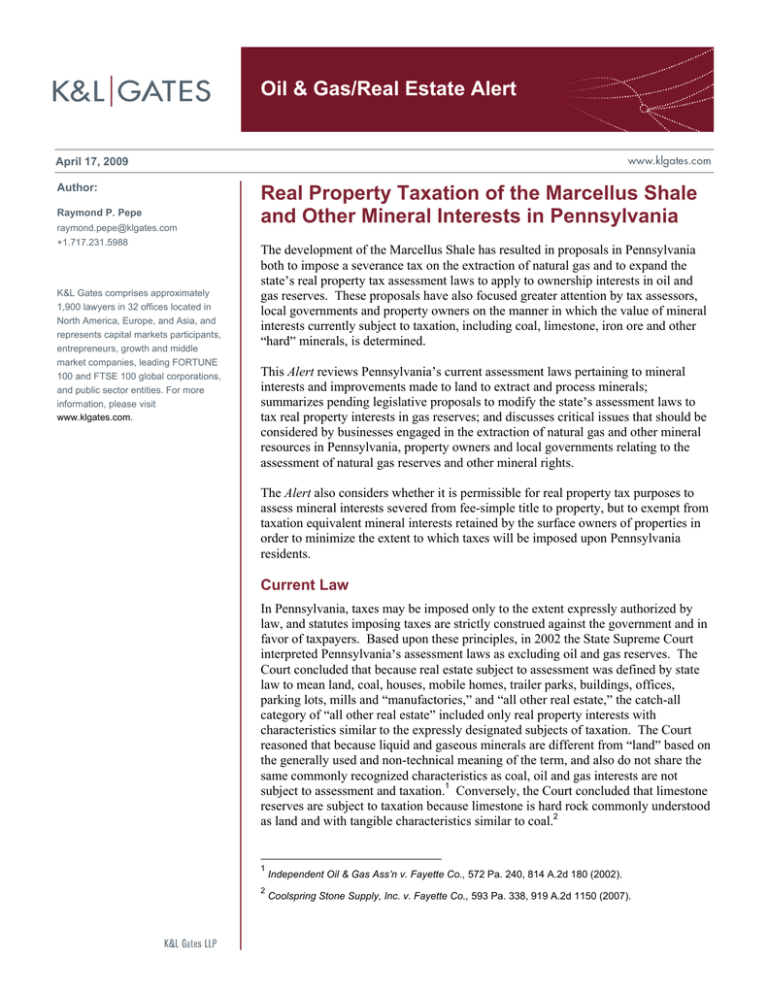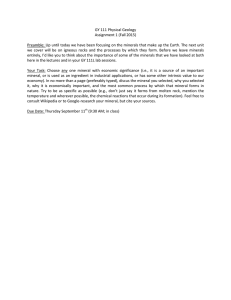
Oil & Gas/Real Estate Alert
April 17, 2009
Author:
Raymond P. Pepe
raymond.pepe@klgates.com
+1.717.231.5988
K&L Gates comprises approximately
1,900 lawyers in 32 offices located in
North America, Europe, and Asia, and
represents capital markets participants,
entrepreneurs, growth and middle
market companies, leading FORTUNE
100 and FTSE 100 global corporations,
and public sector entities. For more
information, please visit
www.klgates.com.
Real Property Taxation of the Marcellus Shale
and Other Mineral Interests in Pennsylvania
The development of the Marcellus Shale has resulted in proposals in Pennsylvania
both to impose a severance tax on the extraction of natural gas and to expand the
state s real property tax assessment laws to apply to ownership interests in oil and
gas reserves. These proposals have also focused greater attention by tax assessors,
local governments and property owners on the manner in which the value of mineral
interests currently subject to taxation, including coal, limestone, iron ore and other
hard minerals, is determined.
This Alert reviews Pennsylvania s current assessment laws pertaining to mineral
interests and improvements made to land to extract and process minerals;
summarizes pending legislative proposals to modify the state s assessment laws to
tax real property interests in gas reserves; and discusses critical issues that should be
considered by businesses engaged in the extraction of natural gas and other mineral
resources in Pennsylvania, property owners and local governments relating to the
assessment of natural gas reserves and other mineral rights.
The Alert also considers whether it is permissible for real property tax purposes to
assess mineral interests severed from fee-simple title to property, but to exempt from
taxation equivalent mineral interests retained by the surface owners of properties in
order to minimize the extent to which taxes will be imposed upon Pennsylvania
residents.
Current Law
In Pennsylvania, taxes may be imposed only to the extent expressly authorized by
law, and statutes imposing taxes are strictly construed against the government and in
favor of taxpayers. Based upon these principles, in 2002 the State Supreme Court
interpreted Pennsylvania s assessment laws as excluding oil and gas reserves. The
Court concluded that because real estate subject to assessment was defined by state
law to mean land, coal, houses, mobile homes, trailer parks, buildings, offices,
parking lots, mills and manufactories, and all other real estate, the catch-all
category of all other real estate included only real property interests with
characteristics similar to the expressly designated subjects of taxation. The Court
reasoned that because liquid and gaseous minerals are different from land based on
the generally used and non-technical meaning of the term, and also do not share the
same commonly recognized characteristics as coal, oil and gas interests are not
subject to assessment and taxation.1 Conversely, the Court concluded that limestone
reserves are subject to taxation because limestone is hard rock commonly understood
as land and with tangible characteristics similar to coal.2
1
2
Independent Oil & Gas Ass n v. Fayette Co., 572 Pa. 240, 814 A.2d 180 (2002).
Coolspring Stone Supply, Inc. v. Fayette Co., 593 Pa. 338, 919 A.2d 1150 (2007).
Real Estate Alert
The significance of the exclusion of oil and gas
interests from assessment is enhanced in
Pennsylvania by an exclusion from assessment
provided for machinery and equipment used in
manufacturing, mining or industrial
establishments. As a result, many types of land
improvements associated with natural gas
exploration and extraction may also be excluded
from assessment either as machinery and equipment,
or as falling outside of the categories of land
improvements subject to taxation. For example,
drilling rigs, gas wells, and machinery and
equipment used for gas extraction and processing are
excluded from assessment for real property tax
purposes. Other improvements made to land to
facilitate mineral extraction, such as settlement
basins, wastewater treatment plants, and other
specialized types of structures and fixtures, may also
be excluded from assessment depending upon sitespecific facts and circumstances.
Proposed Legislation
House Bill 10 of 2009, sponsored by Representative
Bill DeWeese and 27 other members of the General
Assembly, provides that rights held pursuant to a
lease or other agreement to extract, remove or
recover gas, oil or coal bed methane shall be subject
to taxation as real estate and assessed and taxed
separately from the surface property in the name of
the holder of such rights. The legislation further
provides that these mineral interests will be assessed
utilizing the discounted income approach to value as
supplemented by the sales comparison data.
To facilitate the assessment of mineral interests,
House Bill 10 requires a lessee or operator to
provide annually to the county assessor such
nonproprietary lease and lease income information
as the assessor determines is reasonably needed to
determine value. Using this information, the
legislation would allow counties to change the
assessed value of gas, oil, and coal bed methane
mineral rights whenever information becomes
available that would significantly affect the
valuation of the property, including the
commencement of production on or near the
property, or the depletion of the hydrocarbon gas
subject to the lease and related production.
The Pennsylvania County Commissioners
Association has expressed support for House Bill 10
and similar legislative proposals that will reinstate
the ability to assess oil and gas interests as real
property and to assign standardized valuations to
natural gas storage facilities in order to assess the
value of the property for real estate tax purposes.
Associations representing school districts, which
would likely receive the majority of any revenues
generated by the legislation, as well as associations
representing Pennsylvania municipalities, have also
endorsed House Bill 10.
Critical Issues Arising in the Taxation
of Mineral Interests
Discounting to Present Value
House Bill 10 provides that when the income
approach to value is used, future income streams
must be discounted to present value to provide an
estimate of the value of the property. Discount rates
are amounts which reflect the reasonable net returns
expected by a person investing in a particular class
of real property. The higher the discount rate is
established, the lower the assessed value of property
will become based upon the income approach.
Unfortunately, House Bill 10 fails to provide any
useful guidance regarding how discount rates should
be established. Given the unique nature of oil and
gas interests in property, the lack of guidance on
this important topic is likely to generate substantial
controversy ensuring extensive litigation and greater
administrative costs for county governments. To
properly undertake the income approach to
valuation, discount rates should be used which
reflect the anticipated rate of return customarily
used to justify investments in projects in the oil and
gas industry, taking into account factors relevant to
investments in the industry including the risks
associated with market price variations, the
potential that yields will be less than predicted or
will be subject to interruption or variation, and the
cost of financing mineral development. While it is
possible to amend the legislation to provide
clarification that discounting must reflect the rates
of return required by investors in oil and gas
properties, because there are several different and
generally recognized methods to measure these rates
of return, and the degree of risk associated with
development may vary significantly based upon the
characteristics and location of the mineral resources,
April, 16, 2009
2
Real Estate Alert
the assessment of mineral interests will remain a
difficult and highly contentious process.
These principles regarding the establishment of
discount rates apply not only to the assessment of
oil, natural gas, and coal bed methane, but also apply
to other types of mineral interests already subject to
local property tax assessment, including coal,
limestone, iron ore and other hard minerals.
Avoiding Value-in-Use Assessments
In assessment law, an important distinction is made
between the value of business activities conducted
on a property (referred to as the value-in-use of
property) and the market value of the real estate
itself. Business income is generated by the use of
realty together with personal property, intangible
property, and the skill and business expertise of a
property owner to conduct a business enterprise.
Real property income, in contrast, reflects only
income flows that can be reasonably ascribed to the
use solely of the ownership of real property.
It is important to distinguish the value-in-use of real
property from the value of the property itself
because the rental value of realty is typically only a
small portion of the total value of operating a
business on a property. In addition, when
considered as separate and apart from the value of an
ongoing business, the value-in-exchange of real
property sold or leased separate from the underlying
business may be far less than the value as
determined from the perspective of a business owner
operating a profitable business using the property.
Recognizing these important distinctions,
Pennsylvania courts have consistently held that to
properly determine the fair market value of real
property it is impermissible to directly use business
income to determine the value of real property by
capitalizing the business income stream itself.
Similarly, Pennsylvania courts have also held that it
is impermissible to indirectly rely on business
income to determine the value of real property by
first calculating business income and then
subtracting the value added by specific types of
assets other than realty.
To guard against improper value-in-use assessments,
if legislation such as House Bill 10 is considered by
the General Assembly, language should be added to
the legislation to clarify that income subject to
capitalization must be the likely or actual rental
income a property owner may generate when the
use of mineral interests is leased to third parties
rather than the income generated by oil and gas
extraction activities themselves.
If these issues are not addressed legislatively, they
seem certain to generate significant amounts of
litigation and increase the administrative burdens
imposed on counties. In the absence of legislative
guidance, the owners of mineral interests subject to
assessment will also need to carefully analyze and
review how county assessors establish income
amounts subject to capitalization.
As is the case with selecting a proper discount rate,
avoiding value-in-use assessment is similarly
critical for the assessment of other types of mineral
interests. While these topics have previously not
been a source of major controversy for tax
assessment purposes in Pennsylvania, the debate
and attention being given to House Bill 10 and
similar proposals may result in a greater focus on
the proper assessment of other types of mineral
interests.
Properly Considering Depletion
Just as House Bill 10 provides for the discounting of
income to present value, it also recognizes that once
resources are extracted from a property, the value of
the remaining mineral reserves will decline due to
depletion.
Unfortunately, the approach taken by House Bill 10
is to allow adjustments for depletion through
reassessment initiated by county assessment offices
at their discretion. A more rational and desirable
approach would be to require that whenever the
value of mineral interests is assessed, the
assessments must include a depletion factor to
annually or on some other fixed periodic schedule
automatically reduce values as the available
resources are used up. Because counties are
unlikely to undertake reassessments on their own
that reduce the value of property, as drafted, the
legislation will force property owners to
periodically petition for reassessments. This
approach is not only burdensome for property
owners, but will also substantially increase
April, 16, 2009
3
Real Estate Alert
administrative and legal costs that counties must
incur.
Avoiding Constitutional Litigation
The Uniformity Clause of the Pennsylvania
Constitution requires all taxes to be uniform upon
the same class of subjects within the territorial limits
of the authority levying the tax. The Pennsylvania
Constitution further specifies circumstances in
which exemptions or special provisions for taxation
of property are permissible, and provides that all
laws exempting property from taxation other than
those specifically enumerated by the Constitution
shall be void. Various provisions of the U.S.
Constitution further impose limitations upon state
taxes, including the due process and equal protection
requirements of the 14th Amendment and the
Commerce Clause.
House Bill 10 would allow counties to change the
value of oil, gas, and coal bed methane mineral
interests whenever events significantly affect the
valuation of the property. This procedure contrasts
with existing Pennsylvania law that authorizes the
reassessment of properties only pursuant to
countywide reassessments or in the event of
subdivisions, the construction of new improvements,
or as necessary to correct errors and omissions in a
county s assessment records. As a result, significant
questions will arise regarding whether, in the context
of tax assessments statutorily required to be
determined based upon a common base year,
establishing different reassessment schedules for
certain types of property violates uniformity and
equal protection requirements.
Similarly, House Bill 10 deviates substantially from
existing law by taxing mineral interests severed from
fee-simple title by a lease or other agreement, but
exempting the same mineral interests if retained by
the landowner. It is difficult to identify a rational
basis for exempting from taxation mineral interests
held by fee-simple landowners, but imposing taxes
on identical mineral interests severed from the
remaining interests in the property, other than a
patently discriminatory intent to impose taxes
primarily upon businesses engaged in interstate
commerce that focus their efforts upon mineral
development and to confer benefits upon the owner
occupants of properties located within
Pennsylvania.
Finally, because liquid and gaseous minerals may
not be confined to specific locations, substantial
issues exist regarding whether such fugacious
mineral interests constitute real property owned by a
person with the right to conduct drilling at a specific
location. Real property by definition constitutes a
class of assets that are permanent, fixed and
immovable. In contrast, oil and gas may migrate
within geological formations and may in many
circumstances be completely recovered by drilling
conducted from different locations. As a result,
while oil and gas after extraction constitute personal
property owned by a person with a right to conduct
drilling, prior to extraction, these mineral resources
may be deemed to lack the fundamental
characteristics that allow them to be assessed as a
form of real property.
If these issues posed by House Bill 10 are not
addressed and resolved, and the legislation is
enacted into law, it may take years to resolve the
numerous constitutional issues raised by the
legislation. The result is likely to be the creation of
substantial uncertainty and the imposition of
significant costs upon mineral developers,
landowners, and local governments, the ultimate
impact of which may be to retard mineral
development in Pennsylvania.
K&L Gates comprises multiple affiliated partnerships: a limited liability partnership with the full name K&L Gates LLP qualified in Delaware and
maintaining offices throughout the U.S., in Berlin and Frankfurt, Germany, in Beijing (K&L Gates LLP Beijing Representative Office), in Singapore
(K&L Gates LLP Singapore Representative Office), and in Shanghai (K&L Gates LLP Shanghai Representative Office); a limited liability partnership
(also named K&L Gates LLP) incorporated in England and maintaining our London and Paris offices; a Taiwan general partnership (K&L Gates)
which practices from our Taipei office; and a Hong Kong general partnership (K&L Gates, Solicitors) which practices from our Hong Kong office.
K&L Gates maintains appropriate registrations in the jurisdictions in which its offices are located. A list of the partners in each entity is available for
inspection at any K&L Gates office.
This publication is for informational purposes and does not contain or convey legal advice. The information herein should not be used or relied upon
in regard to any particular facts or circumstances without first consulting a lawyer.
©2009 K&L Gates LLP. All Rights Reserved.
April, 16, 2009
4







